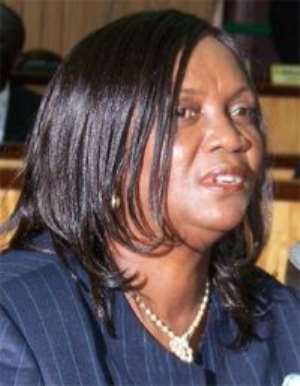
The Commission on Human Rights and Administrative Justice has appealed to all political aspirants and parties to endeavour to uphold the human rights of the electorate and citizenry as a whole, especially as we head into an election year.
The Commission reminded all aspiring candidates, political parties and the electorate that a nation can only make meaningful achievements in growth and poverty reduction if significant numbers of its vulnerable persons do not suffer deprivation of their basic social and economic rights.
Presenting this year's State of Human Rights Report in Ghana during the 2007 United Nations Human Rights Day Celebration in Accra, the Acting Commissioner of CHRAJ, Anna Bossman, noted that it is very important for the country to make wise decisions that will determine the country's direction in the promotion of the rule of law and good governance.
According to her, democracy and good governance cannot be achieved without the presence of the rule of law, freedom and social justice. She said no government can be truly democratic or claim to be promoting good governance if that government fails to recognize the link between human rights and sustainable development, poverty alleviation and eradication.
She observed that CHRAJ, which was set up under the Constitution to promote human rights and thereby enforce the Constitution must be empowered and fully supported to deliver on the aspirations of the people by politicians.
The objective of the state of human rights report is to provide a view of the status of human rights in Ghana. One of the foremost purposes of the report is to promote dialogue on the state's responsibility in ensuring that rights based approaches to poverty alleviation, growth and resource allocation are employed in planning and implementation of policies for vulnerable persons.
The Acting Commissioner praised the country for systematically improving upon its human rights status. "We have surely come a long way in the promotion of human rights and the observance of civil liberties; there is greater freedom of the press and I think that it would be fair to say that we can boast of the largest press houses in Africa.
"There is greater awareness about human rights even in the remotest villages and women and girls who hitherto would not dare are speaking out against domestic violence, illiteracy and their rights to equal opportunities," she said.
The report touched extensively on corruption, police brutalities and mob justice. Other issues that were raised included overcrowding in prisons, remand prisoners, rights to housing, health and education. The others were corporal punishment, women and children's rights and rights of refugees and people living in mining communities.
On corruption, Ms Bossman said there is no doubt that corruption and human rights are interrelated and that corruption has negative impact on human rights.
The report noted that while public perception of corruption do not always tell an accurate story about the nature and spread of corruption in a country, they do provide useful insights on the culture of corruption by which citizens interact with their governments.
Ms Bossman said within the period under review, the fight against corruption remained an important activity for the country, and applauded the efforts made by the Attorney-General and other Ministries, Departments and Agencies to combat corruption.
She also cited several international laws government has ratified to combat corruption and related offences. She mentioned the money laundering law, a code of conduct for the judiciary being developed and the complaints desk established under the Chief Justice's Office to receive and process complaints of misconduct on the part of the court officials, as some of the domestic measures being taken to boost the fight against corruption in the country.
Ms Bossman observed that despite all these measures being taken, the challenges remain unaddressed, citing the delay in the passage of the Freedom of Information Law and inadequate resource allocation to anticorruption agencies. CHRAJ and its stakeholders, she added, have also called on government to decouple the position of the Attorney-General from the Minister of Justice.
By Gilbert Boyefio




 Tuesday’s downpour destroys ceiling of Circuit Court '8' in Accra
Tuesday’s downpour destroys ceiling of Circuit Court '8' in Accra
 SOEs shouldn't compromise on ethical standards, accountability – Akufo-Addo
SOEs shouldn't compromise on ethical standards, accountability – Akufo-Addo
 Father of 2-year-old boy attacked by dog appeals for financial support
Father of 2-year-old boy attacked by dog appeals for financial support
 Jubilee House National Security Operative allegedly swindles businessman over sa...
Jubilee House National Security Operative allegedly swindles businessman over sa...
 Nobody can order dumsor timetable except Energy Minister – Osafo-Maafo
Nobody can order dumsor timetable except Energy Minister – Osafo-Maafo
 Mahama wishes National Chief Imam as he clock 105 years today
Mahama wishes National Chief Imam as he clock 105 years today
 J.B.Danquah Adu’s murder trial: Case adjourned to April 29
J.B.Danquah Adu’s murder trial: Case adjourned to April 29
 High Court issues arrest warrant for former MASLOC Boss
High Court issues arrest warrant for former MASLOC Boss
 Align academic curriculum with industry needs — Stanbic Bank Ghana CEO advocates
Align academic curriculum with industry needs — Stanbic Bank Ghana CEO advocates
 Election 2024: We'll declare the results and let Ghanaians know we've won - Manh...
Election 2024: We'll declare the results and let Ghanaians know we've won - Manh...
